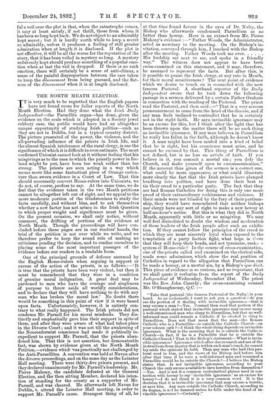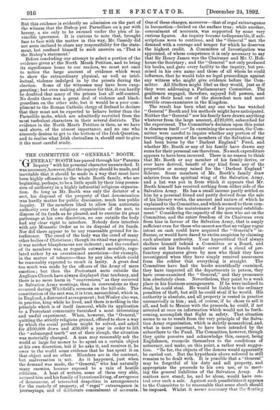THE NORTH MEATH ELECTION.
IT is very much to be regretted that the English papers have not found room for fuller reports of the North Meath Election. Had they done what the Irish Daily Independent—the Parnellite organ—has done, given the evidence on the scale which is adopted in a Society jewel robbery case, the public would have had an altogether unique opportunity of studying Irish politics—such as they are not in Dublin, but in a typical country district. The picture presented of the power, the violence, and the all-pervading influence of the priests in Irish life, and the almost Spanish intolerance of the rural clergy, is one the significance of which it is difficult to over-estimate. The most confirmed Unionist cannot look at it without feeling that his misgivings as to the uses to which the priestly power in Ire- land might be put, have been too weak rather than too strong. The priests are seen acting in a way which seems more like some fantastical piece of Orange carica- ture than sworn evidence in a Court of Law. That this should necessarily convert Home-rulers into Unionists, we do not, of course, profess to say. At the same time, we do feel that the evidence taken in the two Meath petitions cannot be altogether left out of sight, and we appeal to the more moderate portion of the Gladstonians to study the facts carefully, and without bias, and to ask themselves whether a new factor has not arisen in the Irish Question to which proper weight and significance must be given. On the present occasion, we shall only notice, without comment, the drifting of portions of the evidence at North Meath. Though the proceedings will have con- cluded before these pages are in our readers' hands, the trial of the petition is not over while we write, and we therefore prefer to keep the sound rule of making no criticisms pending the decision, and to confine ourselves to placing some of the most important passages of the evidence before our readers in a readable form.
One of the principal grounds of defence assumed by the English Home-rulers when arguing in support or excuse of the action of the priests, is as follows :—‘ It is true that the priests have been very violent, but then it must be remembered that they were in a condition of genuine moral indignation. A great deal may be pardoned to men who have the courage and singleness of purpose to throw aside all worldly considerations, and to declare that they will have nothing to do with any man who has broken the moral law.' No doubt there would be something in this point of view if it were based upon facts. Unfortunately, however, it is entirely con- trary to what really happened. The Irish priests did not condemn Mr. Parnell for his moral misdeeds. They dis- tinctly and emphatically gave him their support in spite-of them, and after they were aware of what had taken place in the Divorce Court ; and it was not till the awakening of the Nonconformist conscience had made it politically in- expedient to support Mr. Parnell, that the priests aban- doned him. That this is not assertion, but demonstrable fact, was shown by evidence given at the North Meath Petition,—evidence which was practically not challenged by the Anti-Parnellites. A convention was held at Navam after the divorce proceedings, and on the same day as the Leinster Hall meeting. There were thirty-five priests present, and they declaredunanimously for Mr. Parnell's leadership. Mr. Pierce Mahony, the candidate defeated at the General Election, and the then sitting Member, declared his inten- tion of standing for the county as a supporter of Mr. Parnell, and was cheered. He afterwards left Navan for Dublin, to attend the Leinster Hall meeting, in order to support Mr. Parnell's cause. Strangest thing of all, he at that time found favour in the eyes of Dr. Nulty, the Bishop who afterwards condemned Parnellism as no better than heresy. Here is an extract from Mr. Pierce Mahony's evidence :—" Father Woods, the Administrator, acted as secretary to the meeting. On the Bishop's in- vitation, conveyed through him, I lunched with the Bishop after the meeting. Father Woods took me over His lordship sat next to me, and spoke in a friendly way." The witness does not appear to have been cross-examined on this statement, and it may, therefore, be assumed to represent the facts. But after this, is it possible to praise the Irish clergy, at any rate in Meath, for their moral sensitiveness ? The next point of evidence which we desire to touch on is connected with the now famous Pastoral. A shorthand reporter of the Daily Independent swore that he took down the following passage in a sermon delivered by a certain Father Graham in connection with the reading of the Pastoral. The priest read the Pastoral, and then said :—" That is a very serious pronouncement to come from the head of the diocese, and if any man feels inclined to contradict that he is certainly not in the right faith. He says invincible ignorance may be an excuse for this but I think after the light that has been thrown upon the matter there will be no such thing as invincible ignorance. If any man believes in Parnellism he really has fallen in the faith, although he doesn't know it. A man might have been misled into a kind of belief that he is right, but his conscience must arise, and he cannot be excused by that. This thing of Parnellism is not defined, but is no less an article of faith. If you believe in it, you commit a mortal sin ; you defy the Church, and make yourself open to excommunication." If the account thus given of the sermon is a correct one, what could be more oppressive, or what could illustrate more clearly the fact that the Irish priests have plunged headlong into politics, and have done their best to tie their creed to a particular party. The fact that they are bad Roman Catholics for doing this is only one more proof of their extraordinary recklessness and violence. If their minds were not blinded by the fury of their partisan- ship, they would have remembered that neither bishops nor clergy have any sort of right to make a new heresy at half-an-hour's notice. But this is what they did in North Meath, apparently with little or no misgiving. We may well feel disinclined to doubt the wisdom and moderation of these leaders of the Irish people after such an exhibi- tion. If they cannot follow the principles of the creed to which they are most sincerely loyal when exposed to the temptation of a party faction fight, what hope is there that they will keep their heads, and not tyrannise, under a system of Home-rule ? In the course of cross-examination, one of the priests called and examined on the clerical side, made some admissions, which show the real position of Catholics in regard to the allegation that Parnellism can be made a heresy, or a mortal sin, by a Bishop's ipse This piece of evidence is so curious, and so important, that we shall quote it verbatim from the report of the Daily Independent of Wednesday, December 21st. The priest was the Rev. John Cassidy ; the cross-examining counsel Mr. O'Shaughnessy, Q.C. :— "Take that pastoral [the famous Pastoral of Dr. Nulty] in your hand. As an ecclesiastic I want to ask you a question—do you see the portion of it dealing with invincible ignorance—that it may excuse a man F—Yes. Counsel then read that portion of the pastoral which stated that invincible ignorance may excuse many a well-intentioned man who clung to Parnellism, but that no well- informed man could remain a Catholic if he elected to cling to Parnellism. Does not that mean that the man—the Roman Catholic who is a Parnellite—is outside the Catholic Church—on your solemn oath ?—I think the whole thing depends on invincible ignorance. What is the meaning that he is outside the Catho ic Church—in fact, if he is a Parnellite that he is outside the Catholic Church ? That is the Bishop's statement.—What is invin- cible ignorance ? Ignorance which after due research and use of the instructions from inquiry that is within each man's reach, he cannot lay aside the opinions he held. Then any man who had this pas- toral read to him, and the views of his Bishop laid before him after that time if he were a well-informed man and remained a Parnellite would he be outside the Church P—I believe the Bishop states that. Is not invincible ignorance, according to your Church the only excuse available to save heretics from damnation P —Yes. And is not it a common ecclesiastical phrase used in con- nection with heresy to say invincible ignorance' as an excuse for heresy P—I do not think it is a very common word. It is the doctrine that it is invincible ignorance that may excuse a heretic, or save him. Any man outside the Catholic Church, according to its dogma, is not he damned unless he falls under the head of in- vincible ignorance P—Certainly." But this evidence is evidently an admission on the part of the witness that the Bishop put Parnellism on 'a par with heresy, a sin only to be excused under the plea of in- vincible ignorance. It is curious to note that, brought face to face with the matter in this way, Mr. Cassidy did not seem inclined to share any responsibility for the state- ment, but confined himself to such answers as, That is the Bishop's statement.' Before concluding our attempt to select a portion of the evidence given at the North Meath Petition, and to bring its significance home to our readers, we must not omit to notice the large amount of evidence which went to show the extraordinary physical, as well as intel- lectual, violence indulged in by the priests during the election. Some of the witnesses may have been exag- gerating; but even making allowance for this, it can hardly be doubted that many of the priests lost all self-control. No doubt there was a great deal of violence and black- gnardism on the other side, but it would be a poor com- pliment to the Roman Catholic clergy of Ireland to declare -that they must not be expected to behave better than the Parnellite mobs, which are admittedly recruited from the most turbulent characters in their several districts. The evidence in the North Meath Petition is then, as we have said above, of the utmost importance, and no one who sincerely desires to get to the bottom of the Irish Question, and to realise what Irish clericalism is, should omit to give it the most careful study.



































 Previous page
Previous page